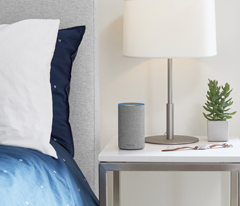Amazon Alexa Could Be Spying On You, But Is That The Worst Of It?
What do the top internet providers have in common with companies like Amazon and Alibaba? To the common consumer, they’re all just big businesses that employ a lot of people and have fancy offices. To people who study the market and the laws controlling it, they represent two cases of neutrality that have a common theme. A theme I will explore in this article.
December 15, 2017
In today’s fast paced age of computer technology and automation, a scenario like that of 2002’s Minority Report can seem closer than ever.
With innovations in home convenience thanks to companies like Google, Tesla, and Amazon, we only grow more connected and more isolated all in the same package.
Speaking of packages, Amazon has been delivering innovations since 1994. Jeff Bezos has gone from selling books out of his garage to nearly cornering the market on shipping goods and home grocery delivery in nearly every single large city. He knows what the market will look like before it even changes.
The real discussion on Amazon focuses on their continued push to be an essential cornerstone of the modern home. An article by The New Yorker highlights the issue with a piece on the Amazon Dash Button. Written in 2015, they had no idea of the horror of Alexa right around the corner.
With the dash button, Journalist Ian Crouch argues that the Dash Button changes the way homeowners shop and give thought to the products we buy. His fear is it will alter the consumer market in favor of the producer and not the consumer. In his words, “But shopping should make you feel bad, if only for a second. Pressing a little plastic button is too much fun.” When we buy products, we shouldn’t feel great about our choice, at least not the whole time. Having a mixed feeling is crucial to being a smart consumer. It allows us to turn back if we feel that a different product would suit us better, which the Dash Button makes very difficult.
Today, the Dash Button is the least of our worries. With Alexa, your streamlined thoughts pour out of your mouth with an Alexa-enabled Echo device not far away to catch the metaphorical money streaming out of you. You need not move your arm, simply summon Alexa to buy whatever is on the top of your mind. No need to be specific or apply scrutiny to an item, Alexa will buy whatever Amazon has deemed to work best for you.
Recently, new products have been released with Alexa integration. Bluetooth speakers, TV’s, and of course Amazon’s own Fire tablets. The convenience of speak-and-buy technology is an experience that is unmatched my Microsoft’s Cortana, Google’s Assistant, and even Apple’s Siri.
Amazon sent a message about two years ago to challengers to back off when they stopped carrying Google’s products. The largest online shopping market rivaled by none not carrying your product is a big deal, and Google felt it where t hurt. Now, other companies who compete with Amazon know to watch their step, because a giant is watching.
This is where the nightmare begins. Slowly, Amazon is moving the ball into their court. It will no longer be a consumer’s market, but a market ruled by third parties who function between the producers and the consumers. No contract mandates these third parties to choose what is best for the consumer, rather they are persuaded to choose what is best for their bottom line.
You can get out from under your covers now, the horror show is over. For now. This future is closer than you may think, but it is entirely preventable. Companies need to make ethical choices. And if they won’t, we need to push legislation to force them to.
It’s undeniable, the convenience Amazon has brought to our lives is something we have grown attached to. These creature comforts are what enable creativity, innovation, and our quality of life to change.

